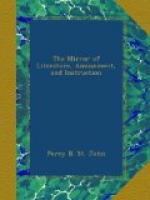Mr. Davy’s first experiments as Professor of Chemistry in the Royal Institution, were made on the substance employed in the process of tanning, with others to which similar properties were ascribed, in consequence of the discovery made by M. Seguier, of Paris, of the peculiar vegetable matter, now called tannin. He was, during the same period, frequently occupied in experiments on galvanism.
To the agriculturist, chemistry is of the first consideration. The dependence of agriculture upon chemical causes had been previously noticed, but it was first completely demonstrated in a course of lectures before the Board of Agriculture, which Mr. Davy commenced in the year 1802, and continued for ten years. This series of lectures contained much popular and practical information, and belongs to the most useful of Mr. Davy’s scientific labours; for the application of chemistry to agriculture is one of its most important results; and so rapid were the discoveries of the author, that in preparing these discourses for publication, a few years afterwards, he was under the necessity of making several alterations, to adapt them to the improved state of chemical knowledge, which his own labours had, in that short time, produced.
In 1803, he was chosen a fellow of the Royal Society, and in 1805, a member of the Royal Irish Academy. He now enjoyed the friendship of most of the distinguished literary men and philosophers of the metropolis, and enumerated among his intimate friends, Sir Joseph Banks, Cavendish, Hatchett, Wollaston, Children, Tennant, and other eminent men. At the same time he corresponded with the principal chemists of every part of Europe. In 1806, he was appointed to deliver, before the Royal Society, the Bakerian lecture, in which he displayed some very interesting new agencies of electricity, by means of the celebrated galvanic apparatus.[1] Soon afterwards, he made one of the most brilliant discoveries of modern times, in the decomposition of two fixed alkalies, which, in direct refutation of the hypothesis previously adopted, were found to consist of a peculiar metallic base united with a large quantity of oxygen. These alkalies were potash and soda, and the metals thus discovered were called potassium and sodium, Mr. Davy was equally successful in the application of galvanism to the decomposition of the earths. About this time he became Secretary of the Royal Society. In 1808, Mr. Davy received a prize from the French Institute. During the greater part of 1810, he was employed on the combinations of oxymuriatic gas and oxygen; and towards the close of the same year, he delivered a course of lectures before the Dublin Society, and received from Trinity College, Dublin, the honorary degree of LL. D.




